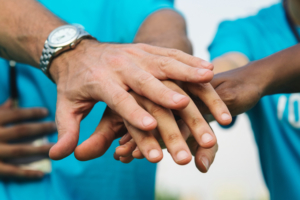The Salvation Army is joining other national, state and local emergency management officials and nonprofit organizations in providing disaster relief for those affected by Hurricane Harvey. The Salvation Army has already deployed 42 mobile kitchens to Texas – each of which can serve can serve an average of 1,500 meals per day – along with other vital Emergency Disaster Services (EDS) units.
Lt. Col. Kelly Pontsler, Divisional Commander of The Salvation Army’s Southwest Division, states that The Salvation Army’s Southern Territory is extremely well equipped and experienced with such disasters, so to date, no EDS teams from the Southwest Division (part of the Western Territory) have been deployed… but are on standby should the call come.
The devastation from the storm has spurred communities across the country to rally in support of those affected, and The Salvation Army is encouraging those that would like to help to make monetary donations to the cause, rather than in-kind donations such as water and other supplies.
“We are extremely grateful for the outpouring of support, and the best way to help during any disaster is to make a monetary donation,” says Lt. Col. Pontsler. “Monetary donations allow disaster responders to immediately meet the needs of the people affected without incurring many of the costs associated with sorting, packing, transporting and distributing donated goods.”
Following are several means to make a monetary donation to The Salvation Army, 100 percent of which will go to assist those affected by Hurricane Harvey:
• Online: helpsalvationarmy.org
• Donate by phone: 1-800-SAL-ARMY
• To receive a donation link via text: Text STORM to 51555
• Mail checks to: The Salvation Army, PO BOX 1959, Atlanta, GA 30301. Please designate “Hurricane Harvey” on all checks.
About The Salvation Army Emergency Disaster Services
The Salvation Army is uniquely positioned to serve those impacted by the storm, however long it takes, because they are there before, during, and after impact. Beyond serving immediate physical needs, they also meet the emotional and spiritual needs that are unique to catastrophic events. The Salvation Army:
• Delivers disaster relief to an average of 382,000 people annually.
• Serves every ZIP code in the United States and touches almost 25 million lives a year.
• Has served survivors of every major national disaster since 1900.
• Remains in communities until needs are met.


